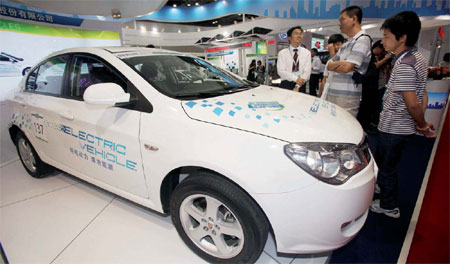Shoppers set to be given new fillip to lift consumption

| To boost domestic consumption, the government plans to take new steps, such as providing subsidies for consumers to buy electrical appliances and energy-effective vehicles, after the previous tax rebate policies expired last year. Chen Xiaogen / for China Daily |
More policies are in the pipelines to ease China's shift to a more consumption-oriented economic model amid weaker prospects for exports and investment.
The government plans to take new steps, such as providing subsidies for consumers to buy electrical appliances and energy-effective vehicles, after the previous tax rebate policies expired last year, or due to expire, Huang Hai, a member of the economic and trade policy consulting committee of the Ministry of Commerce, told China Daily.
The Ministry of Commerce has finished a draft of various stimulus programs aimed at boosting domestic buying over the coming years, especially of vehicles and household appliances, said Huang, who used to be the assistant minister of commerce.
The ministry said on Jan 4 that during the 12th Five-Year Plan (2011-2015) the authorities plan to upgrade the logistics network, reduce transport costs and promote more cities as business centers for the convenience of consumers and to increase spending.
In 2015 total annual retail sales of consumer goods are expected to reach 32 trillion yuan ($5.08 trillion, 3.93 trillion euros), with an average annual increase of about 15 percent, the ministry said.
The National Bureau of Statistics says the value of retail sales of consumer goods was 15.5 trillion yuan in 2010, an increase of 14.8 percent after adjusting for inflation. Consumption figures for last year are to be published this month.
Expanding domestic consumption is seen as a way of boosting the economy over the coming years. The nation's exports have slumped in the past few months as a result of weakened demand from the eurozone countries amid the sovereign debt crisis.
China's exports grew 13.8 percent in November from a year earlier, the lowest increase in about two years, statistics from the General Administration of Customs show.
The export decline is expected to continue this year, which may have a big negative impact on the economy, said Wang Tao, head of China economic research at UBS Securities Co Ltd.
"We forecast the drop in real net exports to subtract 1.4 percentage points from GDP growth in 2012."
With the eurozone countries going into recession and the global economy expected to continue to slow this year, China's trade surplus may further drop to 2 percent of GDP from 9 percent in 2007, Wang said.
"From a global perspective, China's shrinking trade surplus should be seen as a welcome development, as evidence that China has made progress in boosting its domestic demand."
President Hu Jintao vowed last month at the annual Central Economic Work Conference to expand domestic consumption while improving people's livelihoods this year.
Huge infrastructure building projects, the main driver of the nation's average 10 percent real GDP growth in the past decade, will not be repeated in coming years, because so much spending on infrastructure has led to waste in some areas relating to property development, said Blu Putnam, chief economist with CME group, an exchange company in Chicago.
"The shift to a more consumption-oriented economic model, while part of the 12th Five-Year Plan for 2011 to 2015, should be seen as a natural progression for a rapidly developing country. The road to a consumer-oriented growth model will depend critically on real wage growth."
After the global financial crisis in 2008 a series of policies aimed at stimulating domestic consumption were introduced, including giving subsidies to consumers buying household appliances and cars.
Before some of the crisis-related promotional measures ended, sales of electrical appliances might have been strong last month and in the first few days of the year, said Wang of UBS.
Xu Changming, deputy director of the information resource department at the State Information Center, said that with the expansion of the middle-income group and increases in wages, car sales in second- and third-tier cities is likely to exceed those of first-tier cities.
"By the end of 2020 car sales in the third-tier cities are expected to account for 60 percent in the market, compared with 15 percent in the large ones."
A report by Moody's Analytics Inc said that China's economy is unlikely to suffer a "hard landing" as domestic consumption is expected to strengthen. The US rating company predicted growth of 8.7 percent this year.
By the end of November the value of sales of household electrical appliances attributed to the stimulatory policies was about 487.4 billion yuan, the Ministry of Commerce said.
The chief economist with Standard Chartered Bank Co Ltd, Gerard Lyons, said increased spending and the fast growth of the middle class in China and in other emerging economies could give global economic recovery a fillip, despite a recession in Europe and falling spending in the US.
Today's Top News
- ROK leader's visit to help boost bilateral ties
- China's new plan, world's new opportunities
- Expert: US actions, words don't match
- China's diplomacy to blaze new trails
- Visits point way to better future for all
- PLA tests joint combat strength for second day































